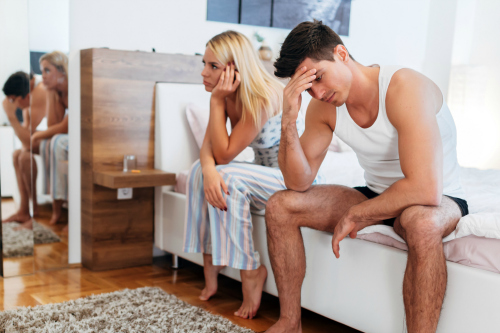
What is anorgasmia (a.k.a. orgasmic disorder)?

Anorgasmia refers to an inability to reach orgasm within a desired amount of time. Some people with anorgasmia are unable to climax at all. Their bodies become aroused (a man has an erection, for example), but no orgasm occurs.
Orgasmic disorders can happen to both men and women and can be distressing for both members of a couple. The person with anorgasmia may feel frustrated and sexually dissatisfied. Partners may worry that they are inadequate or not exciting enough.
Orgasmic disorders are often caused by psychological factors or social factors, such as:
- performance anxiety
- stress
- problems in relationship
- past sexual trauma or abuse
- negative attitudes about sex
- guilt about sex
- sexual inexperience
- inadequate setting (e.g. lack of privacy, inappropriate timing – too late)
Orgasmic disorders can also be the precursors or the results of other sexual dysfunctions, e.g. low sexual desire, arousal problems (erectile dysfunction, lack/low lubrication, or sexual pain).
However, anorgasmia can have physical causes, too. Here are some examples:
- medications
- diabetes
- hypertension
- excessive drug and alcohol use
- chronic pain
- spinal cord injury
- multiple sclerosis
- hormonal problems
- physical disability (motor problems like those in Parkinson’s disease, tremor, rigidity, difficulties in staying in a sexual position)
- attention problems, hyperactivity (ADD or ADHD)
For most women, the clitoris is small and located far from the vagina, therefore many women will easily reach orgasm with direct stimulation of the clitoral area (during outercourse) and not due to penetration (intercourse).
The first step in treating orgasmic disorders is seeing a healthcare provider, particularly one who specializes in sexual health. It may take some time, but a doctor can help pinpoint the cause and recommend treatment accordingly.
For example, some medications have sexual side effects. If a medication appears to cause orgasm problems, a change in medication might help. Or, if diabetes is the suspected cause, a man might need to take better control of his blood sugar.
These tips may also help:
- Maintain a healthy lifestyle. Be sure to exercise regularly and follow a healthy diet. If you smoke, ask your doctor about quitting strategies. If you drink excessively, cut back or stop drinking altogether. Making good choices keeps your whole body healthy and may lower your risk for conditions associated with anorgasmia (and other sexual problems), like diabetes and high blood pressure.
- Talk to your partner. Don’t be afraid to discuss how you’re feeling. If your partner feels inadequate, reassure him or her. You might also talk about adjustments you can make to your sexual routine. Sometimes, people need to tell their partners what they like in bed. If you are unsure yourself, find a private time to masturbate and explore your own body.
- Manage stress. Try relaxation techniques, like deep breathing, yoga, or a hot bath. Ask friends or family members for help with childcare, housekeeping, or anything else that might make you feel overwhelmed.
- Try counseling. Therapy – either alone or with a partner – can address many issues related to anorgasmia, including relationship conflict, past sexual trauma, or negative feelings about sex.
Due to the complexity of female orgasm, women may consider seeing a sex therapist who can teach them to concentrate, fantasize, and enable better stimulation. Therapists can also treat psychological and social barriers.




